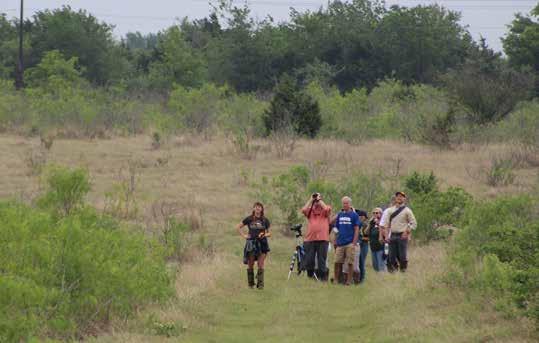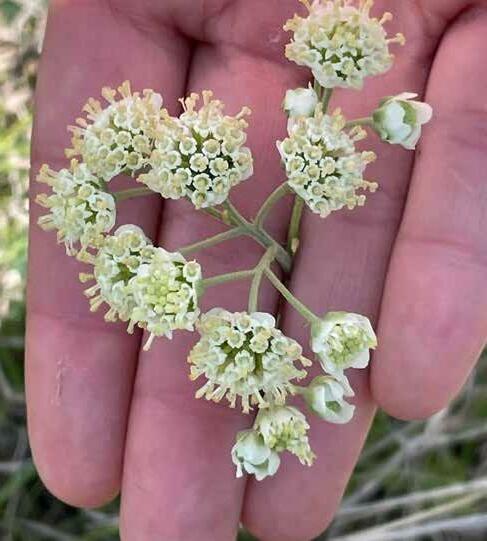
4 minute read
Conservation Legacy
How Time in Nature Benefits our Health
Article by CHAD TIMMONS Photos courtesy of TWA
One disadvantage of spending more time indoors in front of a screen is the isolation it produces. People need to be around other people and being part of a group that enjoys outdoor activities provides tremendous benefits.
We are living in an age where people have become increasingly dependent on technology. We spend anywhere from six to 10 hours a day on average in front of a screen.1,2 Aside from our usual distractions such as streaming services and social media, our screen time grew even more with virtual learning and remote work during the pandemic.
This digital dependency has led people to lose their connection to the outdoors and, as a result, people are spending less and less time outside.6 Research demonstrates that reconnecting with nature has a multitude of benefits for human health. Whether waking up for a morning sit in a deer blind or tree stand, watching your bird feeder for a new species, or simply going on a walk outside, you can experience positive impacts on your quality of life.
We have all heard the importance of taking care of our physical health for longevity. Many of us spend enormous amounts of money to purchase exercise equipment or gym memberships to improve our health. However, research suggests immersing yourself in nature can be beneficial in improving your physical health as well. Studies suggest that the more time spent conducting physical activity in the outdoors, the more likely you are to repeatedly engage in that activity.
Furthermore, physical activity outside can lead to better results than conducting the same activity indoors.4 For children, encouraging play outside promotes physical activities such as climbing, running, and jumping, which leads to positive results in muscle development and flexibility.2
Time spent outside allows our bodies to absorb higher levels of vitamin D, which can strengthen our immune system and reduce risk of heart disease, diabetes, and other health complications.2 In an era where many people are not getting an adequate amount of sleep, exposure to natural light can help our ability to go to sleep earlier and sleep more, improving our overall wellness.2
It is not just our physical health that stands to benefit from time spent in the outdoors. We all juggle responsibilities in our everyday lives such as family, work, school, and a whole host of other obligations. As a result, we sometimes tend to put those responsibilities and pressures ahead of our mental well-being.
Chronic stress can put us at higher risk of health problems such as anxiety, depression, and memory and concentration impairment.3 Spending time in nature can help us cope with stress and even alleviate its byproducts.
Time outside lowers cortisol levels, a stress hormone, and as a result improves our moods and self-esteem. Lowering our cortisol levels can also lead to a reduction in anxiety and depression and can elevate a sense of well-being and fulfillment.4
Researchers also argue that being in nature provides a calming effect which
Finding beauty in the natural world has multiple benefits, research shows. Reconnecting with nature not only improves mental health and wellbeing, but spending less screen time and more outdoor time improves physical health as well.

reduces mental fatigue.4 Additionally, being in green space means we are more likely to engage in social interaction with others, which lowers the likelihood that we will experience the onset of dementia and other cognitive impairments. 4
What’s more, research demonstrates how the presence of green space helps with community wellness. Appreciating nature leads to an increase in empathy and cooperation between people. We are better able to emotionally regulate and demonstrate self-control, reflect on problems, and in certain cases be more generous.6 Studies show that more green space within a community typically leads to a reduction in crime rates and the ability to establish better relationships with your neighbors.4
Understanding the physical and mental health benefits of our experiences in nature helps further illustrate why the Texas Wildlife Association’s mission is so important. Our conservation efforts go beyond our service to wildlife and its habitat. It improves our well-being. Next time you are experiencing a moment of stress or feeling overwhelmed, one of the best remedies could be dedicating time for yourself in the outdoors.
1. Avitt, A. (2021, March 24). The wellness benefits of the great outdoors. In Fs.usda.gov. Retrieved from https://www.fs.usda.gov/ features/wellness-benefits-greatoutdoors 2. Health benefits and tips. (n.d.)
Retrieved from https://www.nwf.org/ home/kids-and-family/connectingkids-and-nature/health-benefits-andtips#section-4 3. Mayo Clinic Staff. (2021, July 8)
Chronic stress puts your health at SUBSCRIBE TO “CRITTER CONNECTIONS” TODAY!
• Quarterly youth magazine of the
Texas Wildlife Association o Issues in February, April, September, November • Available in hardcopy and digital formats o Classroom sets and individual subscriptions • Each issue features puzzles, activities, a feature article about native Texas wildlife, and so much more! • Read-along videos available of past issues.
Sign up here: bit.ly/subscribecritterconnections

risk. In Mayoclinic.org. Retrieved from https://www.mayoclinic.org/ healthy-lifestyle/stress-management/ in-depth/stress/art-20046037 4. Nature makes you. (2019, May 17)
Retrieved from https://www.nps.gov/ articles/naturesbenefits.htm 5. The science of being outdoors. (2021,
April 29) Retrieved from https:// www.kiwanis.org/news/newsitem/ news/newsitem/the-science-of-beingoutdoors 6. Weir, K. (2020, April 1). Nurtured by nature. In Apa.org. Retrieved from https://ww.apa.org/monitor/2020/04/ nurtured-nature

